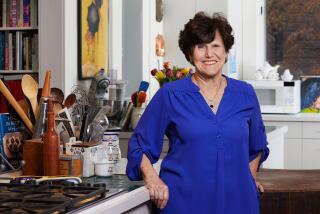Cable Ties Jewish Community Together : A revamp of Jewish Television Network is aimed at attracting people who want to reconnect with their community.
- Share via
Jay Sanderson liked the idea of Jewish Television Network from the moment he heard about it.
“The board members told me that they wanted programs to reach out through cable television to the Jewish and non-Jewish community with news, information, entertainment,” said Sanderson, who was recruited by the JTN board last year to be executive director of the service.
“I told them I thought it was a great idea. Really exciting. I told them, ‘This should be.’ ”
But it already was.
JTN had existed, at that point, for eight years. It was even carried by the cable television company that served Sanderson’s Woodland Hills home. “I had never even heard of it before that meeting, even though I was heavily involved in the Jewish community. I could see they had a real problem.”
This Jewish High Holy Days season marks the first anniversary of Sanderson’s revamping of JTN’s program schedule. Although there are no ratings services that measure the audience for cable shows, Sanderson said he has tangible evidence that JTN is reaching far more of the Jewish populace. JTN’s subscriber list has grown, in just one year, from 60 to more than 700.
“Cable is perfect for what we want to do, which is to reach Jewish people who may have drifted away from the community,” Sanderson said, sitting in one of the spare offices that JTN rents in a Melrose Boulevard office building that has seen spiffier days. “The Jewish newspapers in this country don’t reach those people. They are generally just talking to themselves.
“With cable we go into 600,000 homes just in the Los Angeles area. We have a chance of reaching that young person in the Valley who has maybe intermarried or become assimilated and might want to reconnect with the Jewish community. They flip through the dial and there we are.”
The trick, of course, was getting people to watch.
“In the beginning,” said Sanderson, 33, sitting at his desk in the spare suite JTN rents in a Melrose Avenue office building, “JTN had four rabbis sitting around and talking about Passover. Or maybe the head of the Jewish Federation talking about what was going on in the community. Sometimes they would tape the shows right here, in the back office.
“It was not great television.”
By the mid-1980s, JTN was being kept on the air only through emergency donations given by a handful of people. “The people who started JTN were doing the best they could under the circumstances,” Sanderson said. “But there was no real understanding of how to build an audience, how to produce something that an audience would actually want to see.”
Sanderson, who had a background in running nonprofit Jewish ventures, was formerly director of the Brandeis Bardin Institute, a Jewish arts and culture organization in Simi Valley. And he had some experience in television--he had written commercials and in the mid-1970s he sold a script for the “Family” dramatic series that ran on ABC.
“I came on and we started from scratch, raising money and changing the programming.” The budget, raised mostly by board members, went from less than $200,000 in 1988 to its present level of almost $900,000.
“I wanted people who came upon our programming to see very little difference between us and what they might see on a commercial network,” he said, “and of course, getting good production values cost money.”
Adding to the need for a higher budget was the fact that at the same time Sanderson was making changes, some cable outlets stopped showing JTN for free.
“When JTN began, getting free time was easy because cable television was still very young,” Sanderson said. “They needed a product to show.” JTN shows were then on the cable systems’ public access channels, which are free to anyone who wants to produce a television show. But the competition for public access time grew.
“They have great programming, some of the best for cable in the country, and it has greatly improved over the last year,” said Bill Rosendahl, president of Century Cable, which brings JTN into about 150,000 residences in the Los Angeles area. “I enjoy it and I’m not even Jewish.
“But it got to the point where we could no longer guarantee them the prime-time time slots that they wanted and were used to having. Also, they were advertising during their shows for subscriptions, and normally we don’t allow anything having to do with advertising on public access.”
To stay on Century, JTN had to switch from public access status to leased access. Neither Sanderson nor Rosendahl would disclose how much the network pays for its 10 hours a week, but Rosendahl said leased access on Century can run as high as $600 an hour.
JTN is also on leased access on United Cable. But it gets free public access time on Cablevision, United Cable and Continental Cable. Later this month, its programs go on the public access channels on both cable systems serving San Diego.
“We consider JTN a cultural program, so we give the time to them for free,” said Bruce Arditte, a spokesman for Continental. Although JTN does not have to pay to have its programs on Continental, unlike other public access programs, it does pay to tape its shows at Continental’s Hollywood studio. “They wanted higher production values than what we could offer a public access show,” Arditte said.
“We had our own sets built and paid the staff ourselves so that we could take the time to give the shows the quality we want,” Sanderson said.
The most complex weekly show they do is JTN News, hosted by former Cable News Network correspondent Dan Hackel. Each broadcast includes taped reports, with recent topics ranging from anti-Semitism in Eastern Europe to protests by some Jewish groups against what they feel are negative Jewish stereotypes in the Spike Lee film, “Mo’ Better Blues.”
Not surprisingly, there were also, as there are in most editions of JTN News, news reports from Israel and other parts of the Middle East. The reports often include statements from Israeli government officials. A recent story featured several of them expressing the view that the Iraqi-Kuwait crisis proves that the Palestinian situation, a highly sensitive one for Israel, is not the primary source of tension in the Middle East.
Although Sanderson said he does not think of JTN as a mouthpiece for the Israeli government line, he does say the newscast strives to balance news reports on the major broadcast networks that he feels occasionally portray Israel in a bad light.
“If a network does a report on the Palestinian situation, they will start, more often than not, by showing small children throwing rocks at soldiers,” he said. “It makes for good pictures, but it builds the stereotype of the downtrodden Palestinian and the oppressive Israeli.”
JTN counters, he said, with reports on how vulnerable Israelis feel to Palestinian terrorist attacks.
Other weekly shows on JTN include an interview show hosted by Diane Glazer, on which such figures as Henry Kissinger, Jeane Kirkpatrick and Yitzhak Shamir have appeared, and a celebrity talk show with Robert Clary, best known for playing the part of Louis LeBeau on the “Hogan’s Heroes” TV series that aired on CBS from 1965 to 1971.,
Probably the best-known program on JTN is “Judy’s Kitchen,” hosted by Judy Zeidler, author of “The Kosher Gourmet” cookbook. The program has been on JTN for several years, but it used to feature just Zeidler cooking. Now each week there are guest chefs from prominent L.A. restaurants, such as Michel Richard, Michael Roberts, Mark Peel and Nancy Silverton, making kosher versions of dishes from their restaurants.
“When you add those chefs, it makes it sexy television,” Sanderson said. “It appeals to everyone interested in great food.”
Zeidler is able to get those chefs because she and her husband, Marvin, who founded the Zeidler & Zeidler clothing chain, are well known on the restaurant scene. They are major investors in Citrus and Broadway Deli.
JTN does not, even in its revamped form, seem to have much of an impact on local Jewish leaders. None of several local rabbis informally surveyed said they watch JTN with any regularity. None could name the title of a single JTN show.
Although Sanderson would welcome more recognition for his programs from the Jewish hierarchy, he said that one of the biggest priorities for JTN is to reach Jews that at present only rarely have contact with a rabbi.
To that end, he has high hopes for the JTN show “Twenty 2 Forty,” which debuts later this month. It’s a retooling of “JTN Magazine,” a show made up of short features recorded on videotape around Los Angeles.
“The new show will be for people of the age range in the title,” Sanderson said. “There is nothing just for them, now, in Jewish programming and they are very, very important. The show will cover serious matters, like how to find a synagogue and how to join one, but it will also be about where to find the best corned beef sandwich in Los Angeles.”
Sanderson is clearly excited about the program. His pitch on its behalf is not unlike that of any television executive.
“It will be slick, it will be fast-paced. There will be profiles on contemporary people, like a Paul Simon or a Randy Newman.
“It will be high concept.”
More to Read
The complete guide to home viewing
Get Screen Gab for everything about the TV shows and streaming movies everyone’s talking about.
You may occasionally receive promotional content from the Los Angeles Times.







